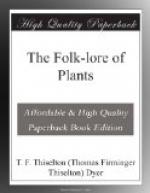“Rowan-tree and red thread,
Put the witches to their speed.”
But its fame has not been confined to any one locality, and as far south as Cornwall the peasant, when he suspects that his cow has been “overlooked,” twists an ashen twig round its horns. Indeed, so potent is the ash as a counter charm to sorcery, that even the smallest twig renders their actions impotent; and hence, in an old ballad entitled “Laidley Wood,” in the “Northumberland Garland,” it is said:
“The spells were vain, the hag returned
To the queen in sorrowful
mood,
Crying that witches have no power,
Where there is row’n-tree
wood.”
Hence persons carry an ashen twig in their pocket, and according to a Yorkshire proverb:
“If your whipsticks made of row’n,
You may ride your nag through any town;”
But, on the other hand, “Woe to the lad without a rowan-tree gall.” Possessed of such virtues, it is not surprising that the mystic ash should have been held in the highest repute, in illustration of which we find many an amusing anecdote. Thus, according to a Herefordshire tradition, some years ago two hogsheads full of money were concealed in an underground cellar belonging to the Castle of Penyard, where they were kept by supernatural force. A farmer, however, made up his mind to get them out, and employed for the purpose twenty steers to draw down the iron door of the vault. On the door being slightly opened, a jackdaw was seen sitting on one of the casks, but the door immediately closed with a bang—a voice being heard to say,
“Had it not been
For your quicken tree goad,
And your yew tree pin,
You and your cattle
Had all been drawn in.”
Another anecdote current in Yorkshire is interesting, showing how fully superstitions of this kind are believed[25]:—“A woman was lately in my shop, and in pulling out her purse brought out also a piece of stick a few inches long. I asked her why she carried that in her pocket. ‘Oh,’ she replied, ‘I must not lose that, or I shall be done for.’ ‘Why so?’ I inquired. ‘Well,’ she answered, ’I carry that to keep off the witches; while I have that about me, they cannot hurt me.’ On my adding that there were no witches nowadays, she instantly replied, ’Oh, yes! there are thirteen at this very time in the town, but so long as I have my rowan-tree safe in my pocket they cannot hurt me.’”




